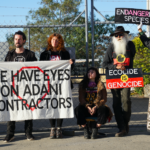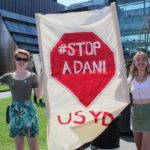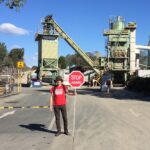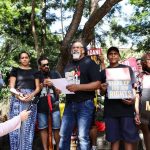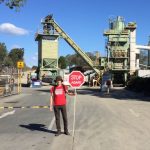“Adani’s Mine Is Up and Running”: Frontline Action on Coal’s Andy Paine on Disrupting It
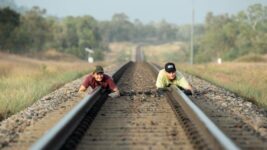
As Australia shutdown for the Christmas-New Year period, Indian mining giant Adani announced on 27 December, that it was close to sending its first shipload of coal exports from its Carmichael mine, situated in central Queensland’s Galilee Basin, overseas.
The greenlighting of the environmentally devastating Adani mine was given despite the ongoing Stop Adani campaign, which has been operating for the last seven years: a time that has seen a significant spike in extreme weather incidents marking the onset of the climate crisis.
As renowned environmental activist Bob Brown warned in March 2019, the opening up of the Galilee Basin by Adani further paves “way for five or six other huge coal mines” to be established in the region. And one of these additional projects is being pushed by Clive Palmer.
A spokesperson for Adani’s Australian subsidiary Bravus Mining and Resources said in a statement last week that the first shipment was then being assembled at the North Queensland Export Terminal in Bowen, adding that the mine’s plan is to export 10 million tonnes of coal annually.
At the frontline
Frontline Action on Coal has been privy to these developments. Indeed, over late November and into December, its members carried out a series of nonviolent direct actions that successfully blocked each of the first three trainloads of coal bound for the port, causing significant and costly delays.
On 30 November, climate activists Andy Paine and Tammy Omodei blocked the first coal train leaving the Adani mine, using steel pipes to lock themselves onto rail tracks.
This signalled that while the mine might be operational the fight to bring it to an end continues.
Following the halting of the third train on 15 December, activists Kyle Magee and Franz Dowling climbed onto the locomotive’s carriages and commenced shovelling the coal out of them and onto the ground below. This act of civil disobedience continued for over 20 hours.
On appearing before Bowen Magistrates Court two days later, Magee was unexpectedly charged with fraud, contrary to section 408C of the Criminal Code 1899 (Qld).
The activist was then remanded. And on appeal to the Queensland Supreme Court, he was released on bail six days later.
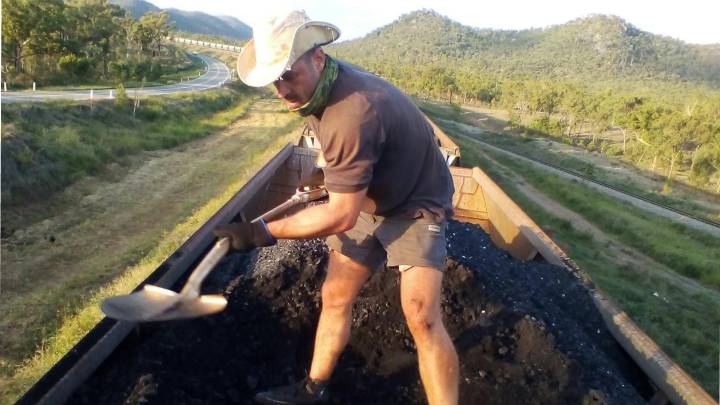
A crackdown on climate activism
The Human Rights Law Centre, Greenpeace and the Environmental Defenders Office released a report in late November, outlining that while the need for climate activism is increasing, over recent years, it’s coming “under sustained attack”.
This involves heightened repressions, which include tough laws specifically targeting climate action, enforcement of punitive bail laws and excessive penalties over minor acts, threatening climate concerned charities with deregistration, and the surveilling and infiltration of climate groups.
Sydney Criminal Lawyers spoke to Frontline Action on Coal spokesperson Andy Paine about the heavy reprimand that Magee faced, the fact that the Adani mine is now operating, and what he expects we’ll see in the coming year in regard to climate activism and the penalisation of it.
Frontline Action on Coal activist Kyle Magee was arrested on 16 December after disrupting a coal train connected to Adani’s Carmichael coal mine. Police and the Bowen Magistrates Court initially refused bail, although he was later released.
Surprisingly, the activist was charged with fraud. And he’s due back in court in February.
Andy, what was the reaction of Frontline Action on Coal to Magee being remanded over his nonviolent direct action and the fraud charge that he was given?
The fraud charge was something we found surprising. Kyle will be pleading not guilty, because we’re not sure that his actions fit the definition of fraud, and we don’t want the prosecution throwing around spurious charges.
We’ll be fighting that, as there are lots of other offences, they could have charged him with, which would have fit better.
In terms of his being held on remand, this is something that we’ve expressed concern about quite a bit over the years: the use of the Bail Act as punishment, which we see as an inappropriate use.
This involves people who aren’t a flight risk or a threat to public safety being given bail conditions that stop them conducting protests. It’s an improper use of the Bail Act and an infringement on the right to protest.
In a number of cases, including this one, we consider refusing bail as another example of the misuse of these laws. And the Supreme Court decision to overturn it and grant him bail is vindication of that.
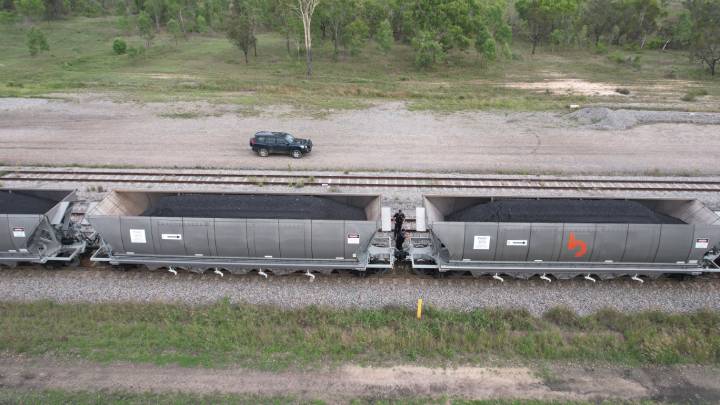
So, do you know why they’ve gone with a charge of fraud?
No. We will have to wait and see the brief of evidence. It does refer to the subsection that says causing pecuniary damage to somebody, but the action involved shovelling coal out of a carriage and dumping it on the ground.
Kyle did this very openly. He didn’t use any dishonesty or manipulation, and so we’ll have to wait and see what happens in court.
This is not the first time Magee has been refused bail. And this happened around the time Blockade Australia’s Sergeio Herbert was sentenced to prison for a civil disobedience action at Newcastle Coal Port. He was subsequently locked up before being released pending appeal.
The Human Rights Law Centre has just released a report tracking the toughening of sanctions being imposed upon climate activists.
Andy, you’ve been monitoring these developments. What are your thoughts on the assertion that the authorities are cracking down on climate activism?
Throughout the history of civil disobedience, you can see sentences varying as circumstances change.
Sentencing is not necessarily the main concern when it comes to the repression of climate activism using the legal system.
The examples of both Sergeio and Kyle didn’t come out of the blue. Although, we think they are unreasonable.
One of the things we really liked coming out of that Human Rights Law Centre report was that they talked about things like the use of bail conditions to restrict protest and the government threatening to take away the tax deductible gift recipient status of NGOs who engage in climate activity.
These are the kinds of things that aren’t being reported in the media, but those of us in the movement are familiar with. So, we were very grateful to see the Human Rights Law Centre discuss them.
The recent sentencing, in itself, is of concern. But, across the board, sentencing for most of those doing climate activism isn’t a concern.
You mentioned bail conditions. Quite a few climate activists have been raising this issue of late. So, are the authorities ramping up bail conditions in terms of climate action?
It’s something that they’ve been using for a long time. I even know of a case in the 90s, where bail conditions were overturned by the Supreme Court, because the conditions barred going to any protests, and the court considered this an improper use of bail.
So, it’s not something that’s new. But it is something we are seeing a lot of recently.
We are seeing these conditions restricting freedom of movement, association, or the ability to protest.
Within the legal system, the presumption is supposed to be for bail, unless some very strict set of circumstances arises to deny bail.
In Kyle’s case, we see bail conditions being used as an opportunity to throw some extra punishment in, rather than have the effect it’s supposed to have.
Not long ago, it was common to expect the courts to go easy on climate activists. So, why was this lighter approach to nonviolent direct action taken, and what does it mean now that it appears to have passed?
Historically, most people would acknowledge the role that civil disobedience has played with social progress in our society, and the role it plays in democracy, when there is unequal access to institutions of power.
Ordinary people are required to use things like civil disobedience to make the world better and to right societal wrongs. That has been proven throughout history.
So, because of that, there is generally a sort of contract in the courts, where it’s understood that civil disobedience activists only break the laws that they consider to be unjust, and in response, the courts have recognised that the laws weren’t broken for selfish reasons.
That kind of contract is long standing in our legal system.
This arrangement is important to allow people to have access to all the tools of social change that aren’t just writing letters to MPs. They have to use means that are proven to be effective, one of which is civil disobedience.
We see occasional problems where this contract is being broken by the prosecution, by the courts and by police. And we have to remind these institutions of the importance of civil disobedience for a healthy democracy.
Reports on what’s actually happening on the ground with the Adani mine are scarce at present. Magee shutdown a train linked to the mine for an entire 20 hours. He was shovelling coal out of loaded carriages.
So, how far along is the Adani Carmichael coal mine at present?
Towards the end of the year, Frontline Action on Coal stopped three coal trains from Adani. They were the first three trains carrying coal to come from the Adani mine, and there have been subsequent trains after that.
So, the mine is now functioning. They are exporting coal. And if they haven’t got a shipload of coal yet, it isn’t far off. Adani’s own media have said that.
So, despite the incredible campaign over the years, and an amazing effort by the people of Australia, it does seem like Adani’s mine is up and running, and probably will be for some time.
But there continues to be concerns about its viability.
COP26 was widely seen as a failure. The focus was on cuts by 2030, as well as net zero by 2050. Yet, critics state that the focus of governments is way off the mark in terms of the immediacy of the emergency.
What’s your understanding of where we’re at in the climate crisis at this point?
COP26 was a disappointment for those of us who want to see us take the action required, and the scientists have been adamant about this for a long time.
The last few IPCC reports have been clear that we need to take drastic action in reducing the use of fossil fuels and their mining if we are going to stop catastrophic climate change.
It’s a shame that something like COP26, where scientists get up and say this and governments will acknowledge it, but, at the same time, they show how incapable our economic system is in being able to take the logical action to preserve our species and the planet.
That is why climate change represents a real challenge for us. In saying that we want to have a society that’s sustainable and fair to future generations, we need to make massive changes now.
That won’t come from meetings of heads of state, like COP26. It needs to come from everyday people getting together, working with what tools they have to create change and try to create a fairer and more sustainable society.
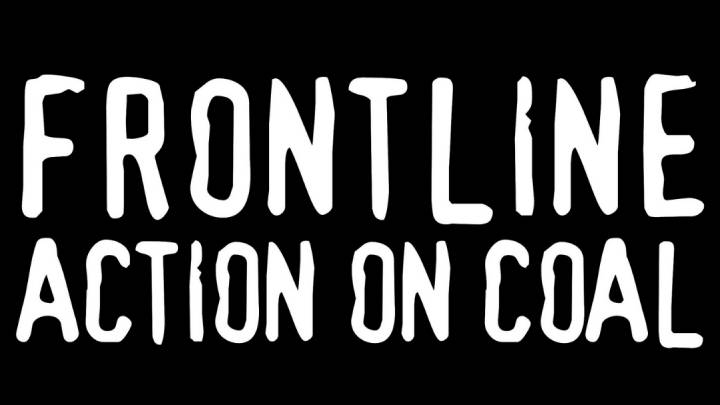
And lastly, Andy, as we’ve discussed, climate activists are now facing a criminal justice system that’s increasing sanctions against them.
What do you expect is going to happen going into the new year, both in terms of activism and the approach of authorities?
Climate activism certainly won’t stop. Climate is the biggest and most imminent moral challenge of our time.
People of all walks of life are concerned about the effects of the way we are living has on our planet, and they’re going to keep trying to change that.
The harder it is to get a response from our government, the more we will need to keep trying different tactics, and that will include civil disobedience.
I can guarantee climate actions won’t stop in 2022, and, hopefully, there will be more creative, bigger and more diverse movements for change.
In terms of the authorities, we have seen signs that they’re becoming less tolerant of climate activism, and that they’re cracking down on it.
They can continue to try and suppress climate activism, or the alternative would be to start listening to some of the demands and try to change these unjust things about our society.
So, I hope that the listening to demands is the direction that they go in, but I can’t guarantee that.
But, as I said, I can guarantee that people of conscience and courage are going to keep working to try to stop climate disaster.



